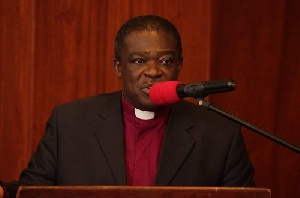The current threats and attacks on some churches, especially in neighbouring Burkina Faso, is wakeup call to church leaders in Ghana to ensure tight security at their places of worship.
Reverend Dr Kwabena Opuni-Frimpong, a Lecturer at the Department of Religious Studies, Kwame Nkrumah University of Science and Technology, said the safety of church members on church premises had been taken for granted over the years and there was the need to re-consider those safety issues.
“With the current terrorist threats on churches in some West African countries including Ghana, church leaders must show much more concern about security of their members and facilities,” he said.
He said the recent terrorists’ attacks on churches in Sri Lanka, Burkina Faso, and other places must set the security strategy agenda.
“While trusting the good Lord to provide His people with security we must also accept responsibility of our actions. The approach must remain a divine intervention and human action”.
Speaking to the Ghana News Agency in Accra, Rev Opuni-Frimpong, a former General Secretary of the Christian Council of Ghana, said: “In times like this, our Lord Jesus Christ’s instruction of; watch and pray, ought to remain our guiding principle”.
He said church leaders, ushers, and other workers must be trained on some basic skills in security, body language and how to move people to safety.
Closed-circuit television (CCTV) equipment and other security gadgets must be installed on church premises, while attention paid to sitting arrangements of new members and visitors, with constant security, “until their dedication can be trusted,” he said.
“The impression that the churches must take care of their own security under the recent terrorist threats cannot, therefore, be a serious option. Church leaders, members and facilities must be protected from any form of attacks by the state security agencies,” Rev Opuni-Frimpong noted.
He said the state security must even be extended to other religious bodies as Muslims have been attacked by terrorists’ groups in some countries.
“The various security agencies, as a matter of urgency, must initiate a national conversation on the security of our country, especially in the face of terrorist threats and attacks.”
Education and right information on terrorists’ activities must be given to religious leaders, heads of academic institutions, hotel managers, and media houses, among others, to avoid panic and false alarms, he said.
“The security agencies may need to consider providing the public with additional contact numbers purposely for information on terrorists’ suspicious activities.”
“Christian and Muslim leaders must pay much more attention to inter-faith relations.”
“We are Ghanaians first before becoming members of our various faith communities. Religious leaders must strengthen our bond of cooperation and demonstrate to the world that we will not allow innocent Ghanaian blood to be shed just because of our religious, ethnic, political affiliations, differences and expressions,” Rev. Opuni-Frimpong said.
General News of Sunday, 26 May 2019
Source: ghananewsagency.org

















